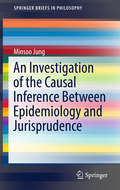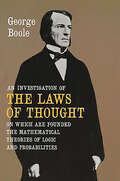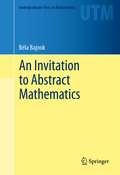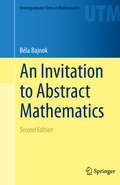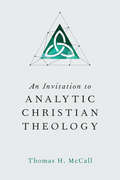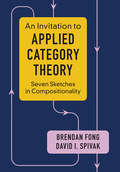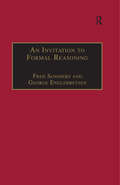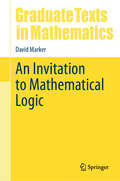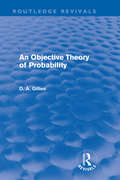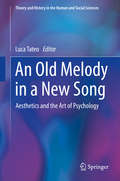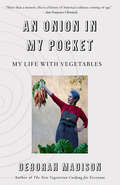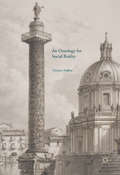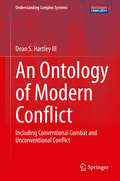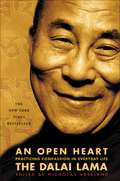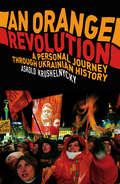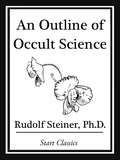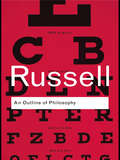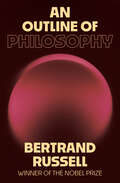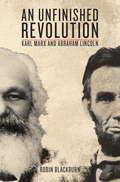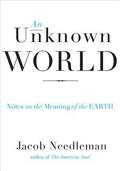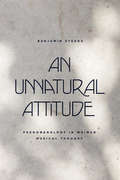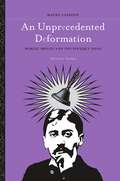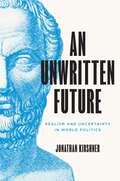- Table View
- List View
An Investigation of the Causal Inference between Epidemiology and Jurisprudence (SpringerBriefs in Philosophy)
by Minsoo JungThis book examines how legal causation inference and epidemiological causal inference can be harmonized within the realm of jurisprudence, exploring why legal causation and epidemiological causation differ from each other and defining related problems. The book also discusses how legal justice can be realized and how victims' rights can be protected. It looks at epidemiological evidence pertaining to causal relationships in cases such as smoking and the development of lung cancer, and enables readers to correctly interpret and rationally use the results of epidemiological studies in lawsuits. The book argues that in today's risk society, it is no longer possible to thwart the competence of evidence using epidemiological research results. In particular, it points out that the number of cases that struggle to prove a causal relationship excluding those using epidemiological data will lead to an increase in the number of lawsuits for damages that arise as a result of harmful materials that affect our health. The book argues that the responsibility to compensate for damages that have actually occurred must be imputed to a particular party and that this can be achieved by understanding causal inferences between jurisprudence and epidemiology. This book serves as a foundation for students, academics and researchers who have an interest in epidemiology and the law, and those who are keen to discover how jurisprudence can bring these two areas together.
An Investigation of the Laws of Thought
by George BooleGeorge Boole was on of the greatest mathematicians of the 19th century, and one of the most influential thinkers of all time. Not only did he make important contributions to differential equations and calculus of finite differences, he also was the discoverer of invariants, and the founder of modern symbolic logic. According to Bertrand Russell, "Pure mathematics was discovered by George Boole in his work published in 1854."This work is the first extensive statement of the modern view that mathematics is a pure deductive science that can be applied to various situations. Boole first showed how classical logic could be treated with algebraic terminology and operations, and then proceeded to a general symbolic method of logical interference; he also attempted to devise a calculus of probabilities which could be applied to situations hitherto considered beyond investigation.The enormous range of this work can be seen from chapter headings: Nature and Design of This Work; Signs and Their Laws; Derivation of Laws; Division of Propositions; Principles of Symbolical Reasoning; Interpretation; Elimination; Reduction; Methods of Abbreviation; Conditions of a Perfect Method; Secondary Propositions; Methods in Secondary Propositions; Clarke and Spinoza; Analysis, Aristotelian Logic; Theory of Probabilities; General Method in Probabilities; Elementary Illustrations; Statistical Conditions; Problems on Causes; Probability of Judgments; Constitution of the Intellect. This last chapter, Constitution of the Intellect, is a very significant analysis of the psychology of discovery and scientific method.
An Invitation to Abstract Mathematics (Undergraduate Texts in Mathematics)
by Béla BajnokThis undergraduate textbook is intended primarily for a transition course into higher mathematics, although it is written with a broader audience in mind. The heart and soul of this book is problem solving, where each problem is carefully chosen to clarify a concept, demonstrate a technique, or to enthuse. The exercises require relatively extensive arguments, creative approaches, or both, thus providing motivation for the reader. With a unified approach to a diverse collection of topics, this text points out connections, similarities, and differences among subjects whenever possible. This book shows students that mathematics is a vibrant and dynamic human enterprise by including historical perspectives and notes on the giants of mathematics, by mentioning current activity in the mathematical community, and by discussing many famous and less well-known questions that remain open for future mathematicians. Ideally, this text should be used for a two semester course, where the first course has no prerequisites and the second is a more challenging course for math majors; yet, the flexible structure of the book allows it to be used in a variety of settings, including as a source of various independent-study and research projects.
An Invitation to Abstract Mathematics (Undergraduate Texts in Mathematics)
by Béla BajnokThis undergraduate textbook promotes an active transition to higher mathematics. Problem solving is the heart and soul of this book: each problem is carefully chosen to demonstrate, elucidate, or extend a concept. More than 300 exercises engage the reader in extensive arguments and creative approaches, while exploring connections between fundamental mathematical topics.Divided into four parts, this book begins with a playful exploration of the building blocks of mathematics, such as definitions, axioms, and proofs. A study of the fundamental concepts of logic, sets, and functions follows, before focus turns to methods of proof. Having covered the core of a transition course, the author goes on to present a selection of advanced topics that offer opportunities for extension or further study. Throughout, appendices touch on historical perspectives, current trends, and open questions, showing mathematics as a vibrant and dynamic human enterprise.This second edition has been reorganized to better reflect the layout and curriculum of standard transition courses. It also features recent developments and improved appendices. An Invitation to Abstract Mathematics is ideal for those seeking a challenging and engaging transition to advanced mathematics, and will appeal to both undergraduates majoring in mathematics, as well as non-math majors interested in exploring higher-level concepts.From reviews of the first edition:Bajnok’s new book truly invites students to enjoy the beauty, power, and challenge of abstract mathematics. … The book can be used as a text for traditional transition or structure courses … but since Bajnok invites all students, not just mathematics majors, to enjoy the subject, he assumes very little background knowledge. Jill Dietz, MAA ReviewsThe style of writing is careful, but joyously enthusiastic…. The author’s clear attitude is that mathematics consists of problem solving, and that writing a proof falls into this category. Students of mathematics are, therefore, engaged in problem solving, and should be given problems to solve, rather than problems to imitate. The author attributes this approach to his Hungarian background … and encourages students to embrace the challenge in the same way an athlete engages in vigorous practice. John Perry, zbMATH
An Invitation to Analytic Christian Theology
by Thomas H. McCallIn recent decades a new movement has arisen, bringing the conceptual tools of analytic philosophy to bear on theological reflection. Called analytic theology, it seeks to bring a clarity of thought and a disciplined use of logic to the work of constructive Christian theology. In this introduction to analytic theology for specialists and nonspecialists alike, Thomas McCall lays out what it is and what it isn't. The goal of this growing and energetic field is not the removal of all mystery in theology. At the same time, it insists that mystery must not be confused with logical incoherence. McCall explains the connections of analytic theology to Scripture, Christian tradition and culture, using case studies to illuminate his discussion. Beyond mere description, McCall calls the discipline to a deeper engagement with the traditional resources of the theological task.
An Invitation to Applied Category Theory: Seven Sketches in Compositionality
by David I. Spivak Brendan FongCategory theory is unmatched in its ability to organize and layer abstractions and to find commonalities between structures of all sorts. No longer the exclusive preserve of pure mathematicians, it is now proving itself to be a powerful tool in science, informatics, and industry. By facilitating communication between communities and building rigorous bridges between disparate worlds, applied category theory has the potential to be a major organizing force. This book offers a self-contained tour of applied category theory. Each chapter follows a single thread motivated by a real-world application and discussed with category-theoretic tools. We see data migration as an adjoint functor, electrical circuits in terms of monoidal categories and operads, and collaborative design via enriched profunctors. All the relevant category theory, from simple to sophisticated, is introduced in an accessible way with many examples and exercises, making this an ideal guide even for those without experience of university-level mathematics.
An Invitation to Formal Reasoning: The Logic of Terms
by Fred Sommers George EnglebretsenAn Invitation to Formal Reasoning introduces the discipline of formal logic by means of a powerful new system formulated by Fred Sommers. This system, term logic, is different in a number of ways from the standard system employed in modern logic; most striking is its greater simplicity and naturalness. Based on a radically different theory of logical syntax than the one Frege used when initiating modern mathematical logic in the 19th Century, term logic borrows insights from Aristotle's syllogistic, Scholastic logicians, Leibniz, and the 19th century British algebraists. Term logic takes its syntax directly from natural language, construing statements as combinations of pairs of terms, where complex terms are taken to have the same syntax as statements. Whereas standard logic requires extensive 'translation' from natural language to symbolic language, term logic requires only 'transcription' into the symbolic language. Its naturalness is the result of its ability to stay close to the forms of sentences usually found in every day discourse. Written by the founders of the term logic approach, An Invitation to Formal Reasoning is a unique introduction and exploration of this new system, offering numerous exercises and examples throughout the text. Summarising the standard system of mathematical logic to set term logic in context, and showing how the two systems compare, this book presents an alternative approach to standard modern logic for those studying formal logic, philosophy of language or computer theory. Fred Sommers is Professor Emeritus, Brandeis University, USA; George Englebretsen is Professor of Philosophy, Bishop's University, Canada.
An Invitation to Mathematical Logic (Graduate Texts in Mathematics #301)
by David MarkerIn addition to covering the essentials, the author’s intention in writing this text is to entice the reader to further study mathematical logic. There is no current “standard text” for a first graduate course in mathematical logic and this book will fill that gap. While there is more material than could be covered in a traditional one semester course, an instructor can cover the basics and still have the flexibility to choose several weeks’ worth of interesting advanced topics that have been introduced. The text can and will be used by people in various courses with different sorts of perspectives. This versatility is one of the many appealing aspects of this book. A list of suggested portions to be covered in a single course is provided as well as a useful chart which maps chapter dependencies. Additionally, a motivated student will have ample material for further reading. New definitions, formalism, and syntax have been streamlined to engage thereader quickly into the heart of logic and to more sophisticated topics. Part I and Part IV center on foundational questions, while Part III establishes the fundamentals of computability. Part II develops model theory, highlighting the model theory of the fields of real and complex numbers. The interplay between logic and other areas of mathematics, notably algebra, number theory, and combinatorics, are illustrated in Chapters 5, 6, 8, 14, and 16. For most of the text, the only prerequisite is mathematical maturity. The material should be accessible to first year graduate students or advanced undergraduates in mathematics, graduate students in philosophy with a solid math background, or students in computer science who want a mathematical introduction to logic. Prior exposure to logic is helpful but not assumed.
An Invitation to Model Theory
by Jonathan KirbyModel theory begins with an audacious idea: to consider statements about mathematical structures as mathematical objects of study in their own right. While inherently important as a tool of mathematical logic, it also enjoys connections to and applications in diverse branches of mathematics, including algebra, number theory and analysis. Despite this, traditional introductions to model theory assume a graduate-level background of the reader. In this innovative textbook, Jonathan Kirby brings model theory to an undergraduate audience. The highlights of basic model theory are illustrated through examples from specific structures familiar from undergraduate mathematics, paying particular attention to definable sets throughout. With numerous exercises of varying difficulty, this is an accessible introduction to model theory and its place in mathematics.
An Invitation to Philosophy
by Nicholas Capaldi Eugene Kelly Luis E. NaviaSurvey of Western philosophy with a chapter on Oriental philosophy included.
An Objective Theory of Probability (Routledge Revivals)
by Donald GilliesThis reissue of D. A. Gillies highly influential work, first published in 1973, is a philosophical theory of probability which seeks to develop von Mises’ views on the subject. In agreement with von Mises, the author regards probability theory as a mathematical science like mechanics or electrodynamics, and probability as an objective, measurable concept like force, mass or charge. On the other hand, Dr Gillies rejects von Mises’ definition of probability in terms of limiting frequency and claims that probability should be taken as a primitive or undefined term in accordance with modern axiomatic approaches. This of course raises the problem of how the abstract calculus of probability should be connected with the ‘actual world of experiments’. It is suggested that this link should be established, not by a definition of probability, but by an application of Popper’s concept of falsifiability. In addition to formulating his own interesting theory, Dr Gillies gives a detailed criticism of the generally accepted Neyman Pearson theory of testing, as well as of alternative philosophical approaches to probability theory. The reissue will be of interest both to philosophers with no previous knowledge of probability theory and to mathematicians interested in the foundations of probability theory and statistics.
An Old Melody in a New Song: Aesthetics and the Art of Psychology (Theory and History in the Human and Social Sciences)
by Luca TateoThis book explores the relationship between cultural psychology and aesthetics, by integrating the historical, theoretical and phenomenological perspectives. It offers a comprehensive discussion of the history of aesthetics and psychology from an international perspective, with contributions by leading researchers from Serbia, Austria, Portugal, Norway, Denmark, and Brazil. The first section of the book aims at summarizing the debate of where the song comes from. It discusses undeveloped topics, methodological hints, and epistemological questions in the different areas of contemporary psychological sciences. The second section of the book presents concrete examples of case-studies and methodological issues (the new melodies in psychological research) to stimulate further explorations. The book aims to bring art back into psychology, to provide an understanding for the art of psychology. An Old Melody in a New Song will be of interest to advanced students and researchers in the fields of educational and developmental psychology, cultural psychology, history of ideas, aesthetics, and art-based research.
An Onion in My Pocket: My Life with Vegetables
by Deborah MadisonFrom the author of Vegetarian Cooking for Everyone ("The Queen of Greens," The Washington Post)--a warm, bracingly honest memoir that also gives us an insider's look at the vegetarian movement.Thanks to her beloved cookbooks and groundbreaking work as the chef at Greens Restaurant in San Francisco, Deborah Madison, though not a vegetarian herself, has long been revered as this country's leading authority on vegetables. She profoundly changed the way generations of Americans think about cooking with vegetables, helping to transform "vegetarian" from a dirty word into a mainstream way of eating. But before she became a household name, Madison spent almost twenty years as an ordained Buddhist priest, coming of age in the midst of counterculture San Francisco. In this charmingly intimate and refreshingly frank memoir, she tells her story--and with it the story of the vegetarian movement--for the very first time. From her childhood in Big Ag Northern California to working in the kitchen of the then-new Chez Panisse, and from the birth of food TV to the age of green markets everywhere, An Onion in My Pocket is as much the story of the evolution of American foodways as it is the memoir of the woman at the forefront. It is a deeply personal look at the rise of vegetable-forward cooking, and a manifesto for how to eat well.
An Ontology for Social Reality
by Tiziana AndinaThis book explores the complex domain of social reality, asking what this reality is, how it is composed and what its dynamics are in both theoretical and practical terms. Through the examination of some of the most important contemporary theories of social ontology, the book discusses the fundamentals of the discipline and lays the foundations for its development in the political sphere. By analyzing the notion of State and the redesign of ontology, the author argues in favor of a realist conception of the State and shows the reasons why this promotes a better understanding of the dynamics of power and the actualization of a greater justice between generations. This book captures the relationship between different generations within the same political context, and presents it as a necessary condition for the re-definition of the concepts of State and meta-State.
An Ontology of Modern Conflict: Including Conventional Combat and Unconventional Conflict (Understanding Complex Systems)
by Dean S. Hartley IIIThis volume develops and describes an ontology of modern conflict. Modern conflict is a complex adaptive system. As such, it exhibits emergent properties, or properties that are not predictable from simple descriptions of the system. The Modern Conflict Ontology (MCO) creates a structure for collecting and analyzing information regarding both conventional and unconventional conflict in the face of uncertainty. The first three chapters of the book begin the discussion of the MCO. The first chapter introduces the foundational concepts. The second chapter discusses modern conflict in detail. The third chapter provides an overview of ontologies in sufficient detail to make the rest of the book understandable, but without covering the minutia of the subject. The next ten chapters describe the parts of the MCO. Each part is a sub-ontology and is discussed in detail, including connections to the other parts. Instances are used very liberally to ensure that the concepts are made concrete. The final chapter consolidates the descriptions of the ontology into a discussion of “what we can know.” It describes the implementation history and changes from the predecessor Unconventional Conflict Ontology (UCO) to the MCO, plus some uses of the ontology and potential future enhancements. Providing an ontology that describes the entire modern conflict domain, this volume is appropriate for military professionals and academics and professionals in political science, computer science, and operations research.
An Open Heart: Practicing Compassion in Everyday Life
by Dalai LamaCompassion -- sympathy for the suffering of others and the desire to free them from it -- is wrestled with in all spiritual traditions. Yet how does one actually become a compassionate person? What are the mechanisms by which a selfish heart is transformed into a generous heart? When His Holiness the Dalai Lama came to New York in 1999, he spoke simply and powerfully on the everyday Buddhist practice of compassion. Weaving together the contents of several sacred texts, he showed that the path to compassion is a series of meditations. An Open Heart lays out this course of meditation, from the simplest to the most challenging, describing the mental training techniques that will enable anyone of any faith to change their minds and open their hearts. In these meditations the deepest and most profound insights of Buddhist practice become part of one's way of knowing and experiencing the world. An Open Heart is a clear and simple introduction to the Buddhist path to enlightenment, by its greatest teacher, His Holiness the Dalai Lama.
An Orange Revolution: A Personal Journey Through Ukrainian History
by Askold KrushnelnyckyIn December 2004, the world watched as hundreds of thousands of Ukrainians gathered to defy the results of a transparently rigged presidential election. The charismatic popular candidate, Viktor Yushchenko, had been poisoned and disfigured by his opponents. The security forces threatened violent repression. But the demonstrators stayed and, as international pressure grew, the corrupt old regime that had been supported by Putin's Kremlin was deposed. It was the most significant moment for Europe since the fall of the Berlin Wall.An Orange Revolution is the gripping account of this historic uprising and the events that led to it. Ukraine was treated roughly by the twentieth century, occupied by the Germans and annexed by the Soviets. It saw guerrilla fighting after the Second World War and dissent was crushed by successive Communist administrations. Its history has been one of corruption, power struggles, organised crime, but a resiliently optimistic population.Based on firsthand observation and interviews with major players and anonymous demonstrators alike, this is about a people who have forced a lasting change: judges who defied death threats, a murdered journalist, amateur musicians who composed an anthem for the people, and soldiers who staked their lives to back the opposition. An Orange Revolution also traces the story of the author's family, who paid a high price for speaking out. An Orange Revolution is a captivating book about a defining moment in European history.
An Outline of Occult Science
by Rudolf Steiner"It is not a question of merely making certain communications. Presenting them in a manner consistent with a conscientious view of the corresponding plane of life is the real challenge. This is the plane where the loftiest ambitions are often handled poorly, and where knowledge and superstition can become confused one with the other." Rudolf Steiner
An Outline of Philosophy (Routledge Classics Ser.)
by Bertrand RussellIn his controversial book An Outline of Philosophy, first published in 1927, Bertrand Russell argues that humanity demands consideration solely as the instrument by which we acquire knowledge of the universe. From our inner-world to the outer-world, from our physical world to the universe, his argument separates modern scientific knowledge and our ‘seeming’ consciousness. These innovative perspectives on philosophy made a significant contribution to the discourse on the meaning, relevance and function of philosophy which continues to this day.
An Outline of Philosophy (Routledge Classics Series)
by Bertrand RussellThe Nobel Prize–winning British scholar offers readers an introduction to philosophy and explores how we acquire knowledge from the world around us. British philosopher Bertrand Russell believed philosophy was concerned with the universe as a whole. In An Outline of Philosophy, he analyzes the differences between the physical world as defined by modern science and the reality we perceive as humans. He looks at methods of gaining knowledge, learning in infants and animals, as well as the role of linguistic ability. Finally, Russell discusses great philosophers from the past and how some of them might approach the question of humanity&’s place in the universe. Originally published in 1927, An Outline of Philosophy was considered quite controversial. However, Russell was awarded the Nobel Prize for Literature in 1950 &“in recognition of his varied and significant writings in which he champions humanitarian ideals and freedom of thought.&” &“A book of real value. . . . The writing is nearly always of the delightful clarity that we have learned to expect.&” —The Times Literary Supplement &“A book which we cannot afford to miss if we think at all.&” —The Spectator
An Unfinished Revolution: Karl Marx and Abraham Lincoln
by Abraham Lincoln Friedrich Engels Karl Marx Robin Blackburn Raya DunaevskayaKarl Marx and Abraham Lincoln exchanged letters at the end of the Civil War, with Marx writing on behalf of the International Working Men's Association. Although they were divided by far more than the Atlantic Ocean, they agreed on the urgency of suppressing slavery and the cause of "free labor." In his introduction Robin Blackburn argues that Lincoln's response to the IWA was a sign of the importance of the German American community as well as of the role of the International in opposing European recognition of the Confederacy. The International went on to attract many thousands of supporters in over fifty regions of the US, and helped to spread the demand for an eight-hour day--enacted by Congress in 1868 for Federal employees. Blackburn shows how the International in America--born out of the Civil War--sought to radicalize Lincoln's unfinished revolution and to advance the rights of labor, uniting black and white, men and women, native and foreign-born. The International contributed to a profound critique of the capitalist robber barons who enriched themselves during and after the war. It inspired an extraordinary series of strikes and class struggles in the postwar decades. In addition to a range of key texts and letters by both Lincoln and Marx, this book includes Raya Dunaevskaya's assessment of the impact of the Civil War on Marx's theory and a survey by Frederick Engels of the progress of US labor in the 1880s.
An Unknown World
by Jacob NeedlemanThe bestselling philosopher's unforgettable exploration of the true meaning of life on earth, now in paperback for the first time. What is the purpose of life on earth? In An Unknown World, philosopher Jacob Needleman frames man's role on the planet in a completely new and fresh way, moving beyond the usual environmental concerns to reveal how the care and maintenance of a world is something vital and basic to our existence as authentic human beings. "Striking . . . takes some really original positions on topics that have become run into the ground by the same discussions and same assumptions." --Ken Wilbur "His lively prose, storytelling skills and lucid insights draw us into an animated conversation with a brilliant teacher." --Publishers Weekly
An Unnatural Attitude: Phenomenology in Weimar Musical Thought (New Material Histories of Music)
by Benjamin SteegeAn Unnatural Attitude traces a style of musical thought that coalesced in the intellectual milieu of the Weimar Republic—a phenomenological style that sought to renew contact with music as a worldly circumstance. Deeply critical of the influence of naturalism in aesthetics and ethics, proponents of this new style argued for the description of music as something accessible neither through introspection nor through experimental research, but rather in an attitude of outward, open orientation toward the world. With this approach, music acquires meaning in particular when the act of listening is understood to be shared with others. Benjamin Steege interprets this discourse as the response of a young, post–World War I generation amid a virtually uninterrupted experience of war, actual or imminent—a cohort for whom disenchantment with scientific achievement was to be answered by reasserting the value of imaginative thought. Steege draws on a wide range of published and unpublished texts from music theory, pedagogy, criticism, and philosophy of music, some of which appear for the first time in English translation in the book’s appendixes. An Unnatural Attitude considers the question: What are we thinking about when we think about music in non-naturalistic terms?
An Unprecedented Deformation: Marcel Proust and the Sensible Ideas (SUNY series in Contemporary Continental Philosophy)
by Mauro CarboneFrench novelist Marcel Proust made famous "involuntary memory," a peculiar kind of memory that works whether one is willing or not and that gives a transformed recollection of past experience. More than a century later, the Proustian notion of involuntary memory has not been fully explored nor its implications understood. By providing clarifying examples taken from Proust's novel and by commenting on them using the work of French philosophers Maurice Merleau-Ponty and Gilles Deleuze, Italian philosopher Mauro Carbone interprets involuntary memory as the human faculty providing the involuntary creation of our ideas through the transformation of past experience. This rethinking of the traditional way of conceiving ideas and their genesis as separated from sensible experience—as has been done in Western thought since Plato—allows the author to promote a new theory of knowledge, one which is best exemplified via literature and art much more than philosophy.
An Unwritten Future: Realism and Uncertainty in World Politics (Princeton Studies in International History and Politics #186)
by Jonathan KirshnerAn argument for the classical realist approach to world politics An Unwritten Future offers a fresh reassessment of classical realism, an enduring approach to understanding crucial events in the international political arena. Jonathan Kirshner identifies the fundamental flaws of classical realism&’s would-be successors and shows how this older, more nuanced and sophisticated method for studying world politics better explains the formative events of the past. Kirshner also reveals how this approach is ideally equipped to comprehend the vital questions of the present—such as the implications of China&’s rise, the ways that social and economic change alter the balance of power and the nature of international conflict, and the consequences of the end of the US-led postwar order for the future of world politics.Laying out realism&’s core principles, Kirshner discusses the contributions of the perspective&’s key thinkers, including Thucydides, Hans Morgenthau, and Raymond Aron, among others. He illustrates how a classical realist approach gives new insights into major upheavals of the twentieth century, such as Britain&’s appeasement of Nazi Germany and America&’s ruinous involvement in Vietnam. Kirshner also addresses realism&’s limits and explores contemporary issues, including the ascent of great power challengers, the political implications of globalization, and the diffusion of power in modern world politics.A reexamination of the realist tradition, with a renewed emphasis on the crucial roles played by uncertainty, contingency, and contestation, An Unwritten Future demonstrates how a once-popular school of thought provides invaluable insights into pressing real-world problems.
